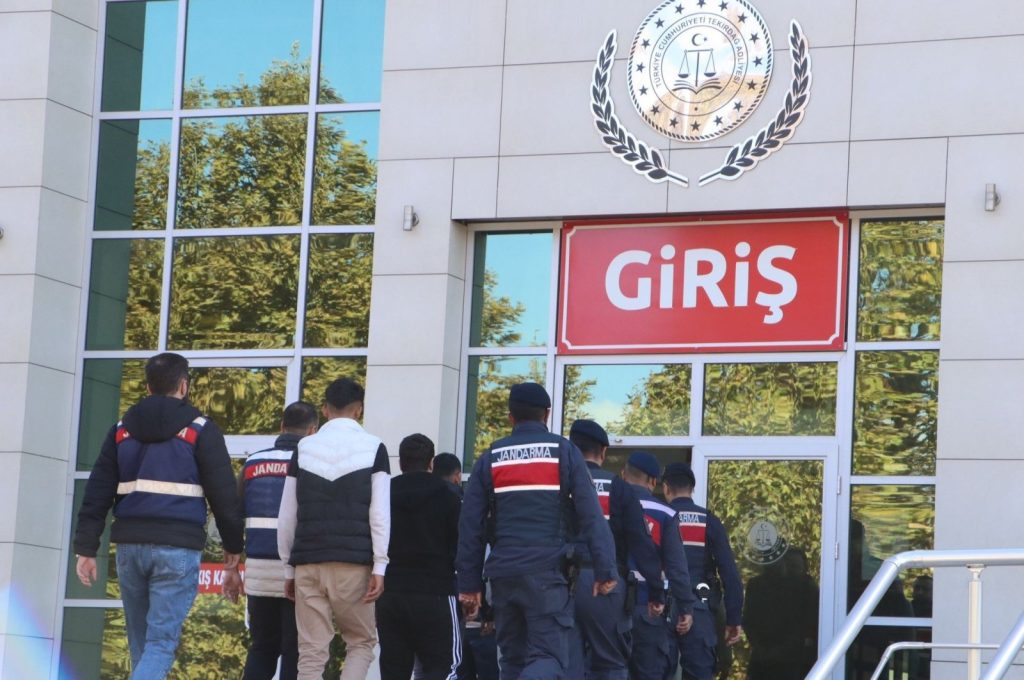Türkiye is widening its crackdown on terrorism on its soil as authorities round up suspects linked to the PKK, Daesh and the Gülenist Terror Group (FETÖ) in nationwide operations.
Security measures have been tightened across the country following an attack by PKK terrorists in Ankara last month that killed five and injured 22 others.
Police captured 231 PKK/YPG suspects in raids across 30 provinces, including Istanbul, Ankara, Izmir and Diyarbakır, Interior Minister Ali Yerlikaya announced Tuesday.
“The suspects are facing charges of operating on behalf of the PKK’s political and press affiliates, spreading terrorist propaganda on social media, raising funds for terrorists, attending street riots and damaging public property,” Yerlikaya said on X.
Police also seized unlicensed weapons, hunting rifles, blank-firing guns and other digital materials during raids, the minister said.
Yerlikaya separately announced police arrested 20 out of 54 wanted Daesh suspects in raids across 18 provinces.
Raids targeted terrorist hideouts in Istanbul, southern Kahramanmaraş, central Nevşehir and others. Some 11 suspects were released on parole while processing is underway for other suspects, according to the minister.
“The suspects are being investigated for being a member of a terrorist organization, aiding and abetting it and spreading its propaganda on social media platforms,” Yerlikaya said.
Separately, police in Ankara are pursuing 50 suspects linked to the PKK and FETÖ in 19 cities as part of two different investigations.
The Chief Public Prosecutor’s Office said it ordered the detention of some 15 suspects for serving in the PKK’s so-called coordination branch in Türkiye and its relevant organizational committees based on witness testimonies and phone record analyses.
The PKK is blacklisted as a terrorist organization by Türkiye, the U.S. and the European Union and is responsible for the deaths of over 40,000 people in a four-decade terror campaign targeting mostly southeastern Türkiye.
The prosecution also said it wants 35 other suspected infiltrators of FETÖ within the Turkish police force, including seven still on active duty. The FETÖ suspects are charged with infiltrating state institutions, recruiting and “coding” personnel, a method the terrorist group uses to mark which members will be promoted within institutions.
Also, on Tuesday, police captured a prominent FETÖ suspect in Istanbul.
Seyfullah Tosun, the lawyer son of Naci Tosun, one of the wanted so-called chiefs of FETÖ, was arrested by an Istanbul court based on testimonies from five confessors that he hid in FETÖ’s “student homes” and went by the code names “Salih” and “Hakan.”
Anti-terrorism police also found Tosun regularly held phone calls with senior members of FETÖ and worked in the directorate of Fatih University, which was shut down in 2016 for its connection to the terrorist group.
FETÖ, which orchestrated a defeated coup in July 2016, still has backers in army ranks and civil institutions, but they managed to disguise their loyalty, as operations and investigations since the coup attempt have indicated. FETÖ is also implicated in a string of cases related to its alleged plots to imprison its critics, money laundering, fraud and forgery.
The group faced increased scrutiny following the coup attempt that killed 251 people and injured nearly 2,200 others. Tens of thousands of people were detained, arrested or dismissed from public sector jobs following the attempt under a state of emergency.
Hundreds of investigations launched after the attempt sped up the collapse of the group’s far-reaching network in the country. FETÖ was already under the spotlight following two separate attempts to overthrow the government in 2013 through its infiltrators.
Daesh remains the second biggest threat of terrorism for Türkiye, which was one of the first countries to declare it as a terrorist group in 2013.
Türkiye has been hit by several major attacks claimed by Daesh, including a 2017 nightclub shooting that killed dozens of people.
Since the 2019 collapse of the self-proclaimed “caliphate,” some suspected Daesh members have settled in Türkiye, operating a so-called Khorasan Province (Daesh-K) network, which looks for “new methods” and recruits more foreign nationals for its activities after constant counterterrorism operations became a “challenge,” according to Turkish security sources.
The National Intelligence Organization (MIT) thwarted the terrorist group’s efforts for recruitment, obtaining funds and logistics support after its latest operation in the aftermath of a church shooting in Istanbul in January.
Terrorists from Daesh and other groups, such as the PKK and its Syrian wing, the YPG, rely on a network of members and supporters in Türkiye.
Also on Tuesday, police took into custody Cengiz Dündar, a member of a district municipal council in the southeastern Diyarbakır province, for alleged ties to the PKK.
Dündar, also a member of the opposition’s Peoples’ Equality and Democracy Party (DEM Party), will be sent to Ankara as part of an ongoing investigation.
The DEM Party is known for its intricate links to the terrorist group and three of its own mayors were also sacked and replaced by government-appointed trustees earlier this month after they were convicted of membership in the PKK. The party subsequently launched protests in the southeast and its supporters confronted police in violent riots.


